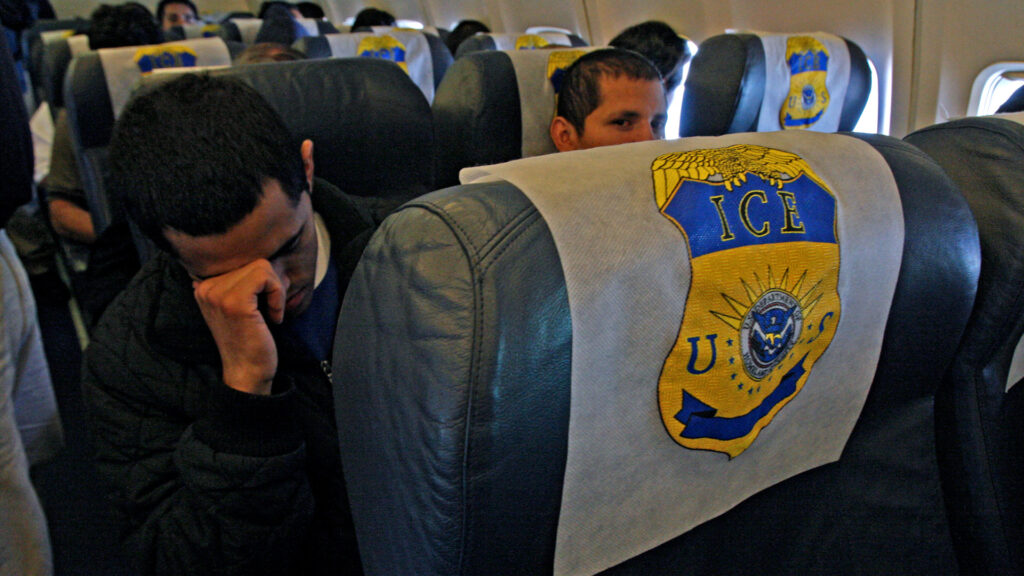The Trump administration asked Ukraine to accept foreign nationals deported from the United States, despite the country’s ongoing war with Russia and its reliance on American military and financial support. Documents reviewed by The Washington Post indicated that a senior U.S. diplomat delivered the request to Kyiv in late January 2025.
The U.S. urged Ukraine to take in third-country nationals without specifying how many. Ukraine has not accepted such individuals. There is no indication that the proposal advanced past the preliminary stage, according to The Washington Post.
The State Department told The Post that “ongoing engagement with foreign governments” was “vital to deterring illegal and mass migration and securing our borders.” The agency directed questions about the Ukraine request to the Department of Homeland Security, which declined to comment.
A Ukrainian diplomat told the U.S. Embassy that the government would respond once it determined a position. Two Ukrainian officials familiar with the matter told The Post that top leadership never received the request.
How does this fit into the Trump administration’s broader deportation strategy?
The outreach to Ukraine is part of the Trump administration’s plans to expand the number of countries willing to accept deportees who are not their citizens.

The administration has pursued deals with governments in Latin America and Africa, pairing deportation requests with financial support or diplomatic incentives. In El Salvador, the Trump administration paid President Nayib Bukele’s government $6 million to house deportees in the CECOT prison facility.
In Panama, the Trump administration secured a deportation deal that allowed the U.S. to send non-Panamanian migrants from Africa and Asia to the Central American country. The agreement followed what officials described as diplomatic pressure, including reported suggestions from U.S. officials that Washington might revisit taking control of the Panama Canal. Panama’s leaders rejected those claims.
“As President, I want to express clearly that every square meter of the Panama Canal and its adjacent area belongs to Panama, and will continue to do so,” Panamanian President José Raúl Mulino said.
The deportation arrangement, hailed by the administration as a breakthrough, drew sharp criticism from human rights groups after detainees were held in poor conditions and denied access to legal counsel, prompting Panama to release dozens of migrants and give them 30 days to leave the country.
What have critics said about these efforts?
Critics point to ethical and logistical issues, especially when proposals target countries in a conflict or that have limited infrastructure. In Ukraine’s case, air travel remains suspended due to Russian attacks. Officials cited wartime conditions as a reason the deportation plan was not possible.
Immigration advocates said the current effort’s scope and tactics depart from those of previous administrations. Yael Schacher of Refugees International told The Post that past administrations have arranged deportations of third-country nationals. However, the Trump administration appears focused on governments that “it knows want to curry favor and are under pressure,” Schacher said.
What countries cooperated with the U.S.?
Unbiased. Straight Facts.TM
In April 2025, the U.S. deported 131 people to Uzbekistan, including nationals of Kyrgyzstan and Kazakhstan, as part of a new bilateral deal.

Go to story →
Rwanda agreed to talks to accept deportees. The Rwandan government received $100,000, according to reports by independent news site The Handbasket, for taking in one Iraqi national. Rwanda committed to accepting 10 more from various countries.
Straight Arrow News has not independently confirmed The Handbasket’s report.
One U.S. official described Rwanda’s participation as part of its effort to align with the administration’s “America First” policy, the Post wrote.
In April, the U.S. deported 131 migrants to Uzbekistan as part of a new agreement between the two countries, according to the Department of Homeland Security. The group included nationals from Uzbekistan, Kazakhstan and Kyrgyzstan.
In addition, the Trump administration may soon begin deporting migrants to Libya, Reuters reported. Three U.S. officials told the outlet that military flights could send deportees to the North African country as early as this week. However, both of Libya’s rival governments have publicly rejected the plan, saying they were not consulted and would not accept migrants from the United States.
What are the implications going forward?
The administration’s reliance on bilateral deportation deals could complicate U.S. relations with strategic partners, The Post reported. Internal correspondence shows some U.S. officials warned that pressuring countries too aggressively, like Uzbekistan, could backfire, giving China and Russia an opening to undercut U.S. influence.
As deportation efforts continue, analysts said they expect closer scrutiny of the legal, diplomatic and humanitarian impact of sending foreign nationals to unstable or unfamiliar destinations.


